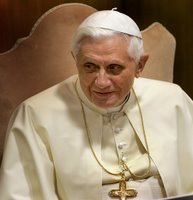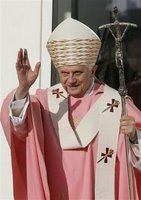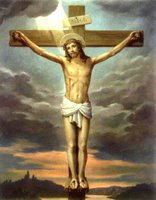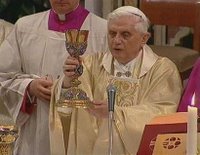
From Gerald Augustinus (
The Cafeteria is Closed): Apparently, this week must have been Hate the Pope Week and someone forgot to send me the memo. This time it's a column in the
San Francisco Chronicle written by a former Catholic, Gustavo Arellano, who apparently could deal with the sex abuse scandal that rocked the Diocese of Orange but who couldn't take the election of Pope Benedict XVI to the Chair of St. Peter. Arrelano just couldn't deal with the election of a man who "represents a step back into the darkness, away from the light of ecumenism, of giving the faithful a greater voice in running the church. Away from a church of love."
Really? A step away from ecumenism? Perhaps Arellano is referring to a different pope; surely he is not referring to the pope who mentions Christian unity in just about every address, speech, and homily he delivers, who has made ecumenism one of the cornerstones of his pontificate from the very beginning. Are we really moving away from "giving the faithful a greater voice in running the church"? It's true that Pope Benedict XVI (and, with him, most Catholics) affirm the hierarchical nature of the Church. We are not a congregationalist Church, nor are we a democratic Church. Pope Benedict XVI does not believe that truth can be made subject to a majority vote, and neither do most Catholics. But I don't think it's fair to say that Pope Benedict XVI is against lay involvement in the Church, even in its governing structures. This is the same pope who was recently praised by the press for talking about opening new doors to women in the Church's institutional structures. And what about that "church of love" thing? Well, Pope Benedict XVI's first encyclical was titled
Deus Caritas Est -- God is Love.
Given the tone of his article, it seems that Arellano is the one who has abandoned the concept of a "church of love." Two of my favorite descriptions of the pope are "Great Deceiver" and "shape-shifter," descriptions which lead one to wonder if Arellano has found a new home in one of the fundamentalist Christian churches which still refer to the Vatican as the Whore of Babylon and the pope as the Anti-Christ. If Satan is the father of lies, what does it imply when one calls Pope Benedict XVI the "Great Deceiver" in capital letters, as if this is a title he should list along with "Supreme Pontiff" and "Bishop of Rome"?
If you couldn't already tell, Arellano's column is long on vitriol but short on facts. One cannot be sure how many errors are Arellano's and how many belong to the book he's reviewing which was written by Robert Blair Kaiser, a book referred to by Arrelano as the "gospel" of disgruntled and former Catholics who either have left or are thinking about leaving the Church over the election of Pope Benedict XVI. Kaiser apparently launches a full out assault against the Church by chronicling "the major schisms, popes, reforms and problems", "the various maneuverings, murders and malaise" -- "enough to make any Catholic turn Episcopalian." His answer to all of these problems? Catholics standing up and claiming "ownership, and, just as important, citizenship" in the Church. Funny, I was under the distinct impression that
Jesus Christ is the sole owner of the Church, and I didn't think that the People of God were citizens of a state, or members of a social club, but parts of the Mystical Body of Christ. For us to stand up and claim "ownership" of the Church for ourselves is for us to become the guillotine severing the Head from the Body, removing Christ from the Church. Is that what Arrelano and Kaiser want?
After subtly (or perhaps not so subtly) declaring that the Catholic Church should set itself ablaze and rise from the ashes as Christianity Lite, Arrelano and Kaiser go on to demonize Pope Benedict XVI and make him the scapegoat for all of their complaints in a kind of unholy parody of Yom Kippur. Reading the column further, we are told that Pope John Paul the Great was some kind of idiot, a puppet controlled by Cardinal Ratzinger.
It was Cardinal Ratzinger, after all, who "put a clamp on the liberation theology movement" -- even though Pope John Paul the Great himself was rather outspoken against liberation theology, working to undermine (for instance) the Sandinista government of Nicaragua which was often supported by the liberation theology movement. Both Pope John Paul the Great and Cardinal Ratzinger were critical of liberation theology because it was and is Marxist ideology which makes use of Christianity to further its agenda; not because they did not believe in the liberation of the poor in Latin America. Both Pope John Paul the Great and Cardinal Ratzinger expressed their strong support for human liberation, but they believed that this liberation must be firmly rooted in the Gospel, in the Cross and Resurrection of Christ. They did not believe in a false liberation which cooperates with and at times endorses atheistic communism.
Moving on. While Pope John Paul the Great "made nice with other religions," Cardinal Ratzinger was undermining "his boss in 2000 by publishing Dominus Iesus, a 2000 document that stated that 'there is no salvation outside the Church.'" Oh, the fallacies! These are the reasons that I was so unhappy, miserable really, with Catholic liberalism. It must first be pointed out that if Pope John Paul the Great's work with other religions was being undermined, then it was he who was doing the undermining: he authorized
Dominus Iesus with a special authorization, referred to as
in forma specifica, meaning that he invested it with his own personal apostolic authority instead of the general authority of the Roman Curia. It must also be pointed out that the quote attributed to
Dominus Iesus in this column cannot actually be found in the document. "There is no salvation outside the Church" -- this is not a quote from
Dominus Iesus. One would think that Arrelano (or Kaiser, if the quote came from him) could have actually
read the document before trying to speak authoritatively about it.
Although I have been rather critical, I actually feel bad for Arrelano (having not read the book and knowing virtually nothing about him, I don't know yet if I feel bad for Kaiser). I have hated Pope Benedict XVI this much. I have participated in the unholy parody of Yom Kippur which loads the burden of my own problems onto the back of the pope and sends him off into the desert with them. Some would say, given my own past remarks about the pope, that I have no right to criticize Arrelano. But it's precisely because of my own past remarks that I can't continue to let these kind of things go. The hate fest against Pope Benedict XVI, which is being perpetuated by the dying liberal movement in the Church and by a media hungry for controversy but bored with facts, has to stop. Pope Benedict XVI was elected by at least a two-thirds majority of Cardinal Electors. He did not appoint himself pope, the Cardinal Electors did that; he did not appoint himself prefect of the Congregation for the Doctrine of the Faith, Pope John Paul the Great did that; he did not appoint himself bishop, Pope Paul VI did that; he did not appoint himself an expert at the Second Vatican Council, the Archbishop of Cologne did that; he did not ordain himself a priest, the Archbishop of Munich-Freising did that.
It's time for Arrelano and so many others to come to terms with the fact that their real problem is not with Pope Benedict XVI, but with the Catholic Church. It is a problem with Pope John Paul the Great, Pope John Paul I, Pope Paul VI, even the much-idolized Bl. Pope John XXIII, and with all of their predecessors before them. It is a problem with innumerable cardinals, bishops, priests, deacons, religious, and lay faithful. It is a problem perhaps with God himself: with a Father who loves too much to let his children trade freedom for anarchy; with a Son who loves too much to let the lost sheep wander off into oblivion; with a Holy Spirit who loves too much to leave us in the sad condition we're in. But we want our anarchy, we want our oblivion, we want our spiritual malady. We are angry that God will not let us have it, that he will not give up on us, and we hate him for it -- but rather than admitting that hatred, we transplant it, we redirect it. We don't want to think that we hate God, that we hate the Church, that we hate the bishops, that we hate the cardinals, that we hate Pope John Paul the Great. And so we just hate Pope Benedict XVI, because it's easier somehow.
I pray that God will open the eyes of all who hate him in his servant to the servants of God, as he has opened my own, so that they can turn away from their hatred and live with him in the love that he's still offering from the Cross. He is Love, and we can have him if we want him.
 My college classes start tomorrow morning. I'll have classes on Tuesdays and Thursdays, and soon I will have a part-time job on the alternating days. This is not to mention that I also plan to have a social life of some sort! This all adds up to the probability of much less blogging which will probably be restricted to weekends or the very limited free time I'll have through the week. And since I already have responsibilities that I have to meet at Sollicitudo Rei Socialis and the Christian Alliance for Progress, this blog may not see more than a post or two per week, at the most. I just wanted to make sure all of my readers know that I won't be around as much.
My college classes start tomorrow morning. I'll have classes on Tuesdays and Thursdays, and soon I will have a part-time job on the alternating days. This is not to mention that I also plan to have a social life of some sort! This all adds up to the probability of much less blogging which will probably be restricted to weekends or the very limited free time I'll have through the week. And since I already have responsibilities that I have to meet at Sollicitudo Rei Socialis and the Christian Alliance for Progress, this blog may not see more than a post or two per week, at the most. I just wanted to make sure all of my readers know that I won't be around as much.












